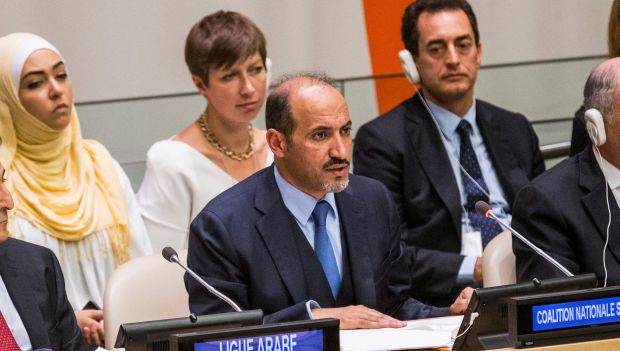
Ahmed Asi Al-Jerba, president of the Syrian Opposition Coalition, speaks at the Friends of the Syrian People meeting on the sidelines of the 68th United Nations General Assembly on September 26, 2013 in New York City. (Andrew Burton/Getty Images/AFP)
The Hague, AP—The global chemical weapons watchdog will discuss Friday a disarmament plan for Syria that calls for inspections of the civil war-torn country’s chemical arsenal to begin by Tuesday.
The draft decision of the Organization for the Prohibition of Chemical Weapons (OPCW) obtained by The Associated Press also authorizes the body to inspect “any other site identified by a State Party as having been involved in the Syrian chemical weapons program, unless deemed unwarranted by the Director-General.”
That goes beyond usual practice as the organization has only previously inspected sites that have been declared by member states.
The draft, being discussed by the OPCW’s executive council Friday night, calls for the organization’s secretariat to, “as soon as possible and no later than 1 October 2013, initiate inspections in the Syrian Arab Republic.” And it lays out the target of destroying all of Syria’s chemical weapons and equipment by “the first half of 2014.”
The draft comes a day after the five permanent members of the United Nations Security Council agreed on the text of a resolution that demands that Syria abandon its chemical stockpile and allow unfettered access to chemical weapons experts. But if Syria fails to comply, the council will need to adopt a second resolution to impose measures under Chapter 7 of the UN Charter, which allows for military and nonmilitary actions to promote peace and security.
The combined OPCW and Security Council action represents a significant breakthrough and rare unity between Russia, which has supported Syrian President Bashar Assad’s government, and the United States.
If the OPCW executive council approves the draft decision later, the Security Council could vote late Friday at the earliest on its resolution.
The OPCW plan says the organization should consider reporting any delay or lack of cooperation by Syria to the Security Council. The draft decision also sets out a clear and ambitious timeline for the verification and destruction of Syria’s weapons and production facilities.
According to the plan, Damascus must, within a week of the decision being approved, provide more detailed information on its arsenal including the name and quantity of all chemicals in its weapons stockpile including precursor chemicals; the type of and quantity of munitions that can be used to fire chemical weapons; the location of the weapons, storage facilities and production facilities. And the destruction of all chemical weapons production and mixing or filling equipment has to be completed no later than Nov. 1.
The decision calls on Syria to “cooperate fully with all aspects of the implementation of this decision, including by providing the OPCW personnel with the immediate and unfettered right to inspect any and all sites in the Syrian Arab Republic.”
The recent flurry of diplomatic activity was triggered by the Aug. 21 poison gas attack that killed hundreds of civilians in a Damascus suburb, and President Barack Obama’s subsequent threat to use military force.
When US Secretary of State John Kerry said Assad could avert US military action by turning over “every single bit of his chemical weapons” to international control within a week, Russia quickly agreed. Kerry and Russian Foreign Minister Sergey Lavrov signed an agreement in Geneva on Sept. 13 to put Syria’s chemical weapons under international control for later destruction, and Assad’s government accepted and quickly signed up to Chemical Weapons Convention that is policed by the Hague-based OPCW.
